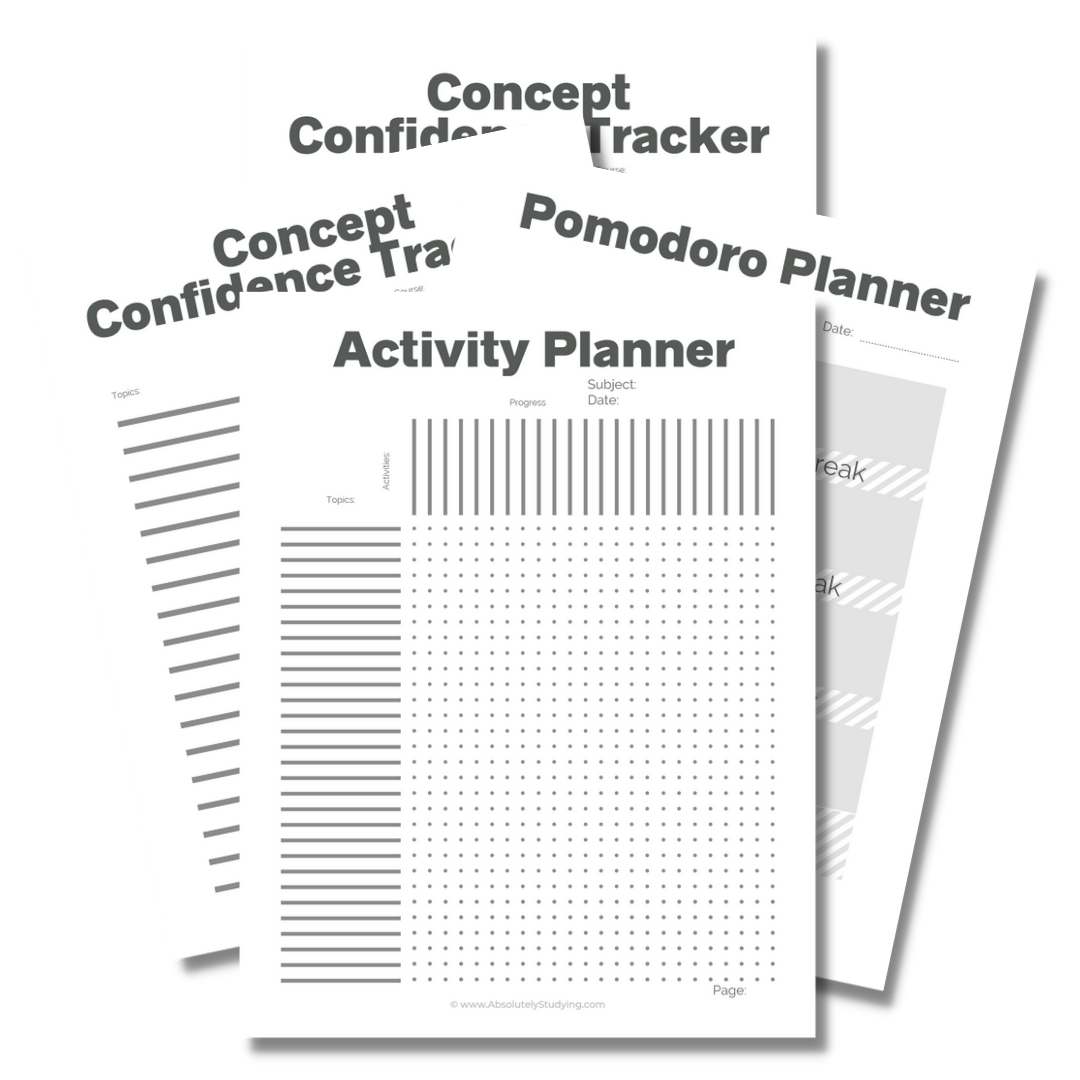A 10-Step Study Plan for Exams That Actually Works
Ace Your Exam with This Ultimate 10-Step Study Plan Guide
10 steps to write a study plan to ace your next exam.
Everything you need for the semester you want!
This bundle includes:
The Syllabus Study Planner
The Pomodoro Planner
A Confidence Tracker
A Q&A planner
The “Get Organized Checklist”
and more!
This workbook is full of super useful resources that can be applied to every aspect of your day.
* Disclaimer * Some of the posted links are affiliate programs. By clicking these links, I may receive monetary compensation. This will not alter the price or change the buyer's experience.
A solid study plan for exams is essential when tests and finals make up such a large portion of your grade. In university, it’s common to see final exams worth up to 45% of your overall mark. With so much riding on one assessment, it’s easy to feel nervous. Anxiety creeps in, pressure builds, and before you know it, panic starts to take over.
The only real way to combat test anxiety is to prepare thoroughly. When you walk into an exam knowing you’ve put in the work and covered the material, you feel more confident in your ability to recall information and answer questions clearly.
To truly prepare, you need to study all the course content in a structured, intentional way. Confidence comes from knowing the material, not from last-minute cramming. This is why having a comprehensive exam study plan matters so much. By creating a clear study schedule, you can map out exactly what you need to study, when you’ll study it, and how you’ll make sure every concept is covered.
You will always have some degree of nervousness walking into your exam. But with a solid schedule to study, these nerves will subside once you sit down and start writing. Breaking up your study sessions and creating a long-term plan of attack is the best way to make sure that everything gets covered thoroughly.
DOWNLOAD NOW: FREE STUDY PLANNER AND ACTIVITY TRACKER
Download your free study planner and activity tracker.
Everything you need for the semester you want!
How to Make a Study Plan for Exams
Preparing for upcoming tests should start at least two to three weeks ahead of time. It’s best not to wait for a professor to announce an exam date; check your syllabus and start well ahead. Setting a timeline can help with this task. Create one to track what you need to cover and how much time you want to spend on each concept.
If you have high expectations of how you want to score on the test, further break down these sessions and plan your activities. This will give you a clear plan with achievable goals as you prepare for your exam.
Start now, and Plan your study guide.
There’s no time like the present! Start right away whenever you are given an assignment or you’ve received notice of an upcoming test. You should immediately write a study plan for exams and include what you need to study and the schedule leading up to it. This is not specific to when the professor announces it. When you receive your syllabus, there is often an outline of all the assignments and tests planned for the class.
Even if the date is not given, you should take this as notice and start planning accordingly. Follow along in your syllabus and check off the concepts as you go through them. This way, you know what is coming up before the professor even announces it.
Set realistic goals for your study Plan.
With a plan and enough motivation, you can accomplish anything that you set your mind to.
With that being said, you must be realistic about your expectations. You can’t go from a failing grade to the honour roll overnight. There are too many steps in between these two extremes.
Commitment to the journey is a must. If you are currently struggling as a student, and you have your sight set on getting A+s, you need to be realistic about the amount of work you are going to have to invest in getting this grade.
Create a plan to raise your grade. Start with a strategy to get caught up on all your current assignments and any you have missed.
Discuss with your teachers if there is a way to get some extra work. Not only will these help with your overall mark, but they will act as study material as well. Even if these assignments are not graded, putting in this effort shows your instructor that you are committed to raising your grade. This might help when they are grading other assignments or considering your participation marks.
Most importantly, if you tend to fall behind in your studies, do your best to get ahead. Use your syllabus to predict what concepts will be studied next and look over them before class.
If you know what is coming up, you can be more engaged in the conversation during class. This will make you a more active learner and ready to digest the information as it is laid out.
Plan out your study schedule.
For example, a 3-credit-hour course has three hours of class per week plus an additional six hours of studying outside of that. If you have a tutorial or a lab, that is an extra 3 hours of class time and six hours of studying.
Class time = 3 hours/week = Minimum study time = 6 hours/week
Lab time = 3 hours = Prepare and review = 6 hours
If this is the rule you have been following so far and have not been getting the results you want, you will need to step up the study time. Plan out your week and insert all the time you expect to spend in class, personal time, and that you already have established for study time. Then see if you can fit in more time to devote to this class.
Do not assign all of your free time to study. You need some time to rest every day as well. Try to give yourself at least 30 minutes before bed to unwind, as well as breaks throughout the day. It may seem counterintuitive, but these breaks will allow you to be more productive.
It could also mean a matter of changing up the way you study. Try to use several different study guides and strategies to ensure that you use numerous methods to cover the material, contributing to better retention and recall. Maybe you have not been studying in a way optimal for your learning style. Trying many different methods can ensure that you find one that works for you.
Plan each study session.
When you are scheduling your study, period, don’t just set time aside. Plan various exercises that you can use to review the information. Whether it’s rewriting your notes, reading your textbook or, creating and using flashcards, the possibilities are endless. Make sure you are using a variety of different strategies to familiarize yourself with the information under study.
I have a free study planner that can help you do this. It has simple templates that allow you to plan out every study session. You can easily create a study plan for exams to conquer all of the material. It even has a study tracker that suggests more than 20 different ways to review the material and record your progress as you go.
Don’t wait to sit down at your study session before you decide how to use your time. Create a study plan and schedule specific activities as you prepare for your week. Have all your materials ready ahead of time.
Don’t just repeat the same old processes over and over again. Burnout often comes from repeating the same process. Having various activities to look forward to during the week can help inspire you to study.
Identify your strengths and weaknesses.
Anytime is a great time to plan activities that play to your strengths. Being aware of your assets and where your weaknesses lie is a great way to plan study activities. This will help you to get the most out of these sessions and succeed.
If you get the best value from testing yourself, reading your textbook over and over is probably not going to be beneficial. If you are a visual learner, play to that strength and incorporate a lot of diagrams, concept maps, and comparison charts into your study efforts. These tweaks will make your study sessions more enjoyable and more fruitful.
Not only will playing to your strengths help you retain the information better, but it will also help you engage more. People generally enjoy doing things they are good at. If you do something entertaining, you are more likely to succeed because you will be more inspired to do it.
Engaging in study activities that you enjoy and are good at may motivate you to study better, maintain a more intense focus, and work longer.
Study in a variety of locations.
Changing up where you study can help to create more mental associations, which will help with recall.
If you are studying in an unfamiliar location, it will keep you alert. This heightened focus may help to further solidify the information in your brain. It will also file similar materials studied in that session together. You might have noticed these effects while writing an exam in the past.
Have you ever encountered a difficult question, which you skip over because you could not remember the answer? Later, when working on a totally different and unrelated problem, you may suddenly think of details about the original question. This is likely because there was a link between these two concepts despite their seeming unconnected. This link may be due to many things, including the location of where the information was studied.
Cues are designed to help you retrieve information. The facts are filed with related data. Prompts to this knowledge can be other information you have learned or even the ambiance of your study surroundings.
Switching your study location ensures that you have an abundance of links to the data. This will help you to locate the facts you need when you sit down to take your test.
Test yourself regularly
Testing yourself is the best way to get an honest understanding of what you do and don’t know. It also gives you the unique opportunity to discover what you think you understand but actually don’t.
Testing your knowledge leading up to an exam is an excellent way to prepare for it. However, checking yourself periodically throughout the semester, whether you have a test coming up or not, is a great way to establish how well you know a topic.
Consistently demonstrating that you have a solid grasp of this information means you can move past it. If you continue to struggle with these quizzes, it shows how much work you have left to do.
Start testing yourself early and assess yourself often to ensure that you stay on top of the material. Continue to test yourself on it throughout the semester, even if you have a firm handle on the information. This way, you will catch yourself if you start to forget important details, and you can refresh yourself on the concept if you need it.
Study Skills Digital Course
Learn how to create a stress-free comprehensive strategy!
Swap practice tests with classmates.
Swapping practice tests that you have created for yourself or with friends in exchange for theirs is a terrific way to hold each other accountable. This is also an excellent way to provide support for each other in the learning process.
It gives you all the same benefits as doing your own practice exams. You also have the added benefit of having an outside perspective on what questions will be asked and how they might be phrased. Trading mock exams will give you the unique opportunity to surprise yourself with challenges rather than make up your own. You can’t do this when you make up the questions yourself.
The most ominous part of an exam is that you cannot control what questions will be asked of you. In this way, it can also help with test anxiety.
Test your study buddy with flashcards.
Quizzing a friend or classmate with flashcards, textbooks, or class notes is a great way to add social interaction to a study session. Not only will it give you a fresh perspective on the information, but it will also allow you to teach another person the data under study.
Teaching is an excellent practice. It allows you the opportunity to consolidate the information and break down the details. Teaching another person ensures that you understand the data enough to communicate the concept and describe your thoughts. This is exactly what tests are designed to gauge.
Cover all material on the test.
Create a study plan that outlines everything you need to study. This will help you to avoid tunnel vision on any particular topic. Extend this to a study schedule to detail when you will review each item to ensure you will cover all material before the test. When there are so many complex topics for you to cover, it is easy to get caught up focusing on one while ignoring others.
Write a study plan for exams in advance and allow adequate time for each topic. Set aside some extra time to go over and clear up any issues you encounter along the way. You may need to spend any time remaining to guarantee that nothing is overlooked.
Planning ahead and setting aside time to cover every topic on your syllabus will save you time and the trouble of cramming on items that you have forgotten. Complicated concepts will often stand out in your head. Still, you need to make sure that you review all of the material taught over the semester. You would not want to be surprised by questions on the exam that you ran out of time to study for.
Maximize Your Study Efficiency with Motion
Creating a comprehensive study plan for exams is essential for acing your exams, but managing all the details can be overwhelming. That’s where Motion comes in. Motion is an innovative tool designed to help you manage your time and tasks more efficiently, ensuring you stay on top of your study schedule and maximize your productivity.
Why Choose Motion?
Automatic Scheduling: Motion automatically schedules your study sessions, assignments, and other tasks into your calendar, optimizing your time and ensuring you cover all the material.
Task Management: Easily manage and prioritize your study tasks with Motion’s intuitive interface. Break down your study plan into manageable steps and set deadlines to keep everything on track.
Focus Time: Motion helps you block out dedicated focus time, allowing you to study without interruptions. This feature ensures you can concentrate fully on your study sessions and retain more information.
Flexibility: Motion adapts to changes in your schedule, automatically adjusting your study plan and calendar to accommodate new priorities and commitments.
How Motion Enhances Your Study Plan for Exams
Using Motion, you can transform your study routine and ensure that no topic is left uncovered. Integrate it seamlessly with your existing calendar to get a holistic view of your study schedule. By automating the scheduling process, Motion saves you valuable time and reduces the mental load of planning your study sessions.
Whether you're a student preparing for exams or managing multiple assignments, Motion provides the structure and flexibility you need to stay organized. It’s like having a personal assistant that helps you prioritize and manage your study time effectively.
Get Started with Motion Today
Ready to take your study planning and productivity to the next level? Sign up for Motion and experience the benefits of automated scheduling and efficient task management. By incorporating Motion into your daily routine, you can achieve your academic goals more effectively and enjoy a more organized, stress-free study experience.
Enhance your productivity and stay on top of your study schedule with Motion. Embrace the future of time management and make creating and sticking to a study plan for exams easier than ever.
It is easy to get caught up in spending all of your time on the concepts that stand out. These may be problems that you struggle with or even the ones you find super easy. But there are so many things in between that you might completely forget about. These sneaky units are the ones you want to make sure you tackle.
Don’t forget to print off my free study planner. This easy-to-use guide will help you to create comprehensive, achievable study schedules for any exam. You can use it to track how you progress in your study efforts for an upcoming test or record your progress over the entire semester. Download yours here.
I would like to be transparent so that there are no misunderstandings. As an affiliate, I may earn a small commission from any products linked in this post. This is not a sponsored post, and I was not asked to recommend these products. These are products that I genuinely love and want to share with my audience.







